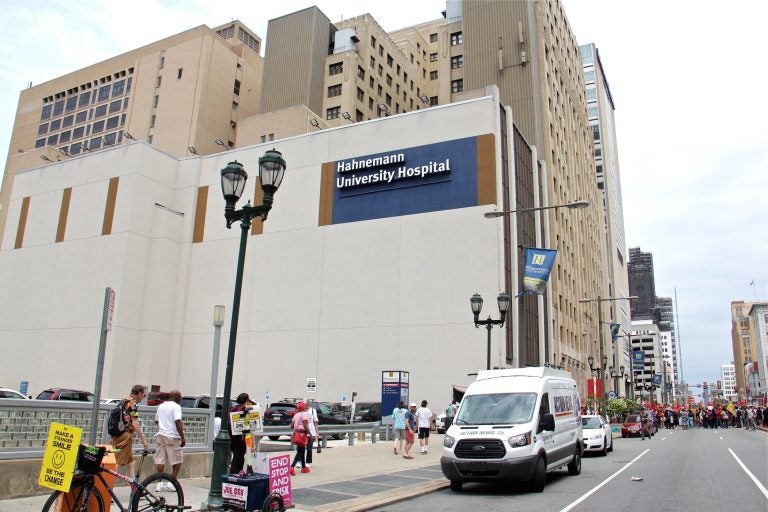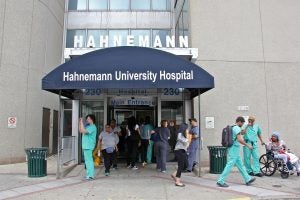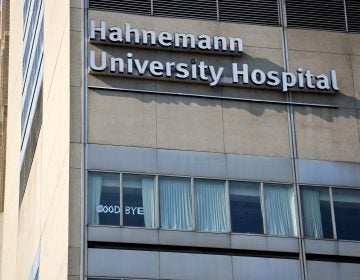Residency sale stalemate hangs up ruling in Hahnemann bankruptcy
The residency slots sold for $55 million at auction as part of Chapter 11 proceedings, pending the judge’s approval. He says he’ll rule Thursday afternoon.

Hahnemann University Hospital. (Emma Lee/WHYY)
A federal bankruptcy judge in Wilmington held off Wednesday on a decision about whether Hahnemann University Hospital can sell its medical residency programs to a consortium of six local health systems led by Thomas Jefferson University Hospitals. The federal government opposes the sale.
U.S. Bankruptcy Judge Kevin Gross now is scheduled to deliver a decision from the bench orally at 3:15 p.m. Thursday.
The residency slots were sold for $55 million at auction last month as part of Chapter 11 bankruptcy proceedings for Hahnemann’s owner, pending the judge’s approval.
If Gross overrules objections lodged by the federal Centers for Medicare and Medicaid, CMS would likely appeal to U.S. District Court.
Many worry such a decision could open the door to hospital systems bundling and selling off residency programs as a commodity.
“We think this sets a dangerous precedent allowing hospitals to be sold for [their] parts, when the parts are maybe more valuable than the whole,” said attorney Mitchell Malzberg,representing the Pennsylvania Association of Staff Nurses and Allied Professionals, the union that represented about 800 nurses at Hahnemann.
If the judge sustains the government’s objection and rules the residency programs can’t be sold, Hahnemann’s owner and its creditors will be out $55 million and will have to continue selling other assets, including St. Christopher’s Children’s Hospital.
During a long day in court Wednesday, U.S. Justice Department attorney Marc Sacks argued that in the Affordable Care Act, Congress laid out the process for redistributing medical residency slots when a hospital closes. It outlines a system for prioritizing hospitals interested in acquiring residents and awards the slots to them, free of charge, through a public bidding process. Sacks said this has happened 14 times since 2010, and that Jefferson had participated in the bidding process.
“If Hahnemann is closing, Congress has said what happens to its residency slots,” Sacks said.
Hahnemann’s lawyers argued that because the hospital is still doing business, it is not closed.
Allen Wilen, chief restructuring officer for Hahnemann’s estate, testified that the hospital still employs about 80 people on payroll and is helping patients who called looking for medical services find new ones and transferring medical records. Until recently, Wilen said, the hospital was spending $8 million to $10 million every two weeks in borrowed financing.
Sacks went on to argue that the residency slots are not assets in their own right — they’re simply the right for a hospital to receive Medicare money.
“What this transaction is is the right to have these 500-plus permanent residency slots going forward,” Sacks told the judge. “They’re not purchasing Hahneman’s equipment, patients, staff, or medical records.”
Mark Minuti, representing American Academic Health Systems, which owns Hahnemann, disputed that point. He pointed to a different statute of the U.S. Bankruptcy Code that interprets the programs as an asset.
Sacks added that even if Judge Gross deemed the hospital still open, CMS regulation states that a Medicare provider number can be transferred only with a change of ownership. He argued that because only the residency programs were being transferred and not all of Hahnemann’s operations, that did not constitute a change in ownership.
Minuti argued that, effectively, the consortium of six hospitals had in fact already taken on the operations of Hahnemann.
“They have our doctors, they have our patients, all at nearby locations,” Minuti told the judge.
Laurence Merlis, executive vice president for strategic partnerships at Jefferson, testified that the consortium has hired 265 of Hahnemann’s former residents and more than 400 staff members who worked there, with 200 more in various stages of employment.
Minuti also argued there was nothing in the statute specifying how many assets needed to be transferred from one hospital to another to constitute a change in ownership.
“Clearly, the government would prefer that there be some handcuffs on how this works,” Minuti said. “But where is the line? There is nothing stipulating how many of your assets you have to sell.”
The government is also concerned about a $3 million cap Hahnemann’s owner proposed for funds CMS could recoup from the new owners of the residency slots for services incurred during the former owner’s tenure. Hahnemann CRO Wilen estimated that $3 million was a reasonable cap. The government would not agree to any cap.
Judge urges feds to negotiate with Hahnemann’s owner
Gross seemed inclined to vote in favor of Hahnemann’s owner and move forward with the sale of the residency slots, but he also recognized the stakes involved in his decision.
Before a midday recess, Gross appealed to Sacks, representing CMS, for one more round back at the negotiating table before duking it out with Hahnemann’s owner in court.
“I recognize your argument, I just think perhaps you are viewing this too narrowly,” Gross told Sacks. “You realize that if you win, this bankruptcy case fails, and I don’t know what benefit that is to the government or to anyone else.”
Sacks responded that it was not up to him to determine the implications of his winning, but that it was his responsibility to argue the law, which he said left no gray area in which to negotiate.
“This is a black-letter law,” Sacks said, adding that he had met with Hahnemann’s representatives and the residency slot purchasers at length to try to work out a deal. “I just don’t think there’s anything more to talk about.”
Two groups had expressed interest in purchasing the hospital as a going concern, and positioned themselves as possible backup plans if the judge ruled against the residency sale.
Gross addressed their objections individually.
California-based KPC Group had participated in the bidding for the residency programs in August and lost to the Jefferson consortium. Minuti, Hahnemann’s attorney, categorized it as a “disgruntled bidder,” and the judge ruled KPC had no standing to object.
SBJ Group, which has bought a hospital in Michigan out of bankruptcy proceedings, is a creditor in this bankruptcy case and so could technically object to the sale of the residency programs. The judge agreed with the lawyer for Hahnemann that SBJ’s proposal to buy the hospital was full of too many contingencies to be taken seriously.
WHYY is your source for fact-based, in-depth journalism and information. As a nonprofit organization, we rely on financial support from readers like you. Please give today.





